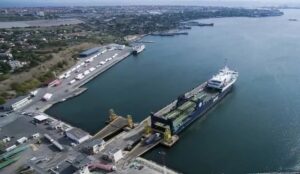
One of Ukraine’s largest grain market operators, Nibulon, has signed a contract with the seaport of Chornomorsk for the transshipment of up to 1 million tons of agricultural products in preparation for the new marketing year, the grain trader’s press service reported on Facebook.
The agricultural holding noted that the signing of this contract was a decisive step in the formation of a flexible logistics model that will allow Nibulon to maintain continuity of exports even without access to its own terminal. In addition, despite the surplus of transshipment capacity on the market, the company managed to achieve a balance of interests. Furthermore, optimized regional logistics will help create added value for Ukrainian farmers.
“Our volume and stability are tools that protect farmers. We work with over 3,000 small and medium-sized agricultural producers who, thanks to efficient logistics, receive competitive purchase prices, allowing them to plan and develop even in difficult conditions,” emphasized Sergey Kalkutin, Nibulon’s logistics director.
The company also emphasized that negotiations with other port operators are currently ongoing.
Before the war, Nibulon cultivated 82,000 hectares of land in 12 regions of Ukraine and exported agricultural products to more than 70 countries around the world. In 2021, the grain trader exported a record 5.64 million tons of agricultural products and delivered record volumes to foreign markets in August (0.7 million tons), in the fourth quarter (1.88 million tons), and in the second half of the year (3.71 million tons).
It is currently operating at 32% of its capacity, has created a special unit for demining agricultural land, and has been forced to move its central office from Mykolaiv to Kyiv.
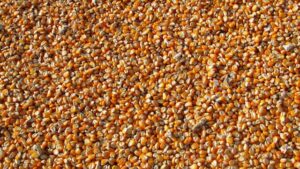
Shipment of agricultural products from the Chornomorsk seaport (Odesa region), whose infrastructure was severely damaged by a Russian missile attack last week, is gradually resuming, Spike Brokers brokerage company reported in a telegram channel.
The brokers noted that in 2023, the share of the Chornomorsk port in the structure of export shipments by water transport was 36%, while the Danube ports accounted for 32%, the Odesa port – 17%, and the Pivdenny port – 15%.
“Over the past week, freight rates for the transportation of corn by ‘coaster’ to the east coast of Italy decreased by $3, to Spain and Israel – by $2. The freight for the transportation of grain by panamaxes from the deep-water ports of Odesa to China and Vietnam decreased by $4,” the experts noted.
As of April 22, the rates for transportation from the port of Chornomorsk to Italy (east coast) amounted to $29-30 (30-35 thousand tons), Spain (Mediterranean) – $30-32 (30-35 thousand tons), Vietnam – $52-54 (60-65 thousand tons), China – $54-56 (60-65 thousand tons).
At the same time, the market rates for transportation by freight from the port of Izmail to the port of Constanta (Romania) as of the specified date are EUR18-22 (4.5-5 thousand tons), to the ports of the Mediterranean coast of Spain – $35-37 (30-35 thousand tons). The rates of transportation from the port of Reni to the ports of Israel range from $33-35 (30-35 thsd tonnes), Spike Brokers stated.
According to a grain market source, who wished to remain anonymous, such a restriction could lead to temporary disruptions in the delivery of products to the terminals of Kernel, Risoil and Viterra groups. In addition, the shutdown of grain terminals could lead to a reduction in April exports of Ukrainian grain via the Black Sea grain corridor to 5 million tons, compared to the expected 8 million tons.
As reported, on April 10, the Russian occupiers damaged railroad sidings to a number of grain terminals located in the port of Chornomorsk during the morning shelling of Odesa region. This resulted in temporary disruptions in the delivery of products to the terminals of Kernel, Risoil and Viterra.
“On the day of the shelling, Ukrzaliznytsia introduced a convention on freight transportation that was to be in effect until April 13, and then extended twice – first until April 17, then until April 22, after which it was lifted.
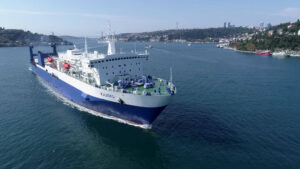
The Chornomorsk-Poti ferry crossing may start operating in the spring of 2024, Yuriy Vaskov, Deputy Minister of Community Development, Territories and Infrastructure, said at the Forbes Ukraine Exporters Summit in Kyiv on Friday.
According to him, Ukraine already has several potential shipowners, as well as potential carriers for the Black Sea-Georgia-Bulgaria-Turkey rail and road connection.
“We are working in all directions. I think that a little later than container transportation (the Chornomorsk-Poti ferry will start operating), but I think it can happen in the spring,” the Deputy Minister said.
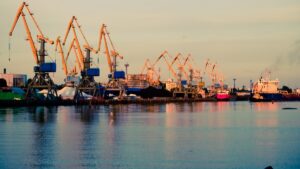
In October-December 2023, Kernel Agro Holding made additional investments to restore the transshipment of vegetable oils at the long-dormant Chornomorsk port, which it acquired in July 2023, allowing the company to start loading the first vessel with sunflower oil in January 2024.
“This was an important milestone in the revival of the company,” Kernel said in its quarterly report published on the Warsaw Stock Exchange.
It also notes that in December 2023, Kernel completed the acquisition of 100% of corporate rights in Reni-Oil LLC, a terminal in the port of Reni for transshipment of sunflower oil with a one-time storage capacity of 15 thousand tons of oil, for $24.75 million. It is indicated that this asset, located on the Danube, is important for the group, providing the ability to export sunflower oil even in the event of a blockade of the Black Sea ports.
According to the report, in December 2023, Kernel acquired a bulk carrier with a capacity of 50 thousand tons of grain, which became the third vessel in the company’s fleet and significantly expanded the group’s transportation and logistics capabilities.
In addition, in December 2023, Kernel launched the fifth cogeneration heat and power plant at one of its oil extraction plants with an installed capacity of 21 MW, which helps to increase resilience to the risk of potential power outages.
“According to the plan, the Group is working on commissioning a new modern oilseed processing plant located in Khmelnytsky region, which is scheduled to be commissioned in spring 2024. At the time of publication of this report, commissioning works have already begun. The plant with a capacity of 1 million tons of sunflower seeds per year will be the largest in Ukraine,” the document also says.
It specifies that in October-December 2023, the company spent $41 million on investments in fixed assets, including the purchase of a Supramax bunker.
As reported, in August last year, Kernel announced the purchase of vegetable oil transshipment facilities in the port of Chornomorsk for $19.4 million and a sunflower oil transshipment terminal in the port of Reni (both in Odesa region) for $24.75 million.
“The one-time storage of 105 thousand tons of sunflower oil will allow the group not to stop the operation of processing plants in case of transportation disruptions, as it was in the 2022-2023 financial years, and to smooth out logistics,” the agricultural holding commented on these acquisitions at the time. “Kernel added that the expansion of infrastructure is “vital” for the agricultural holding ahead of the commissioning of the Starokonstantinivsk oil extraction plant in Khmelnytsky region.
Kernel’s net profit for FY2023 amounted to $299 million, while the company ended the previous year with a net loss of $41 million. The agricultural holding’s revenue for FY2023 decreased by 35% to $3.455 billion, but EBITDA increased 2.5 times to $544 million.
In the first half of FY2024, Kernel’s net profit fell 3.6 times compared to the first half of FY2023, to $102 million, and EBITDA halved to $223 million, with revenue down 16% to $1.59 billion.
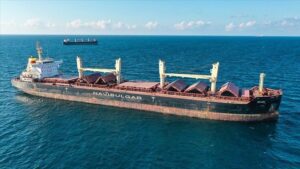
The Turkish Ministry of Defense expects successful loading of grain on two more ships in the sea trade port “Chernomorsk”.
As reported on the ministry’s official Twitter page on Tuesday, the Liberian-flagged OCEAN LION vessel has already departed Chernomorsk with 64,720 tons of corn on board, destined for South Korea.
The ship under the Turkish flag RAHMİ YAĞCI is to deliver 5.3 thousand tons of sunflower meal in bulk from Chornomorsk to Istanbul.
The ministry also said that the inspection of four ships with Ukrainian grain awaiting inspection by the Joint Coordination Center (JCC) will also be carried out in the coming hours.
As reported, on July 22 in Istanbul, at the proposal of the UN, Ukraine, Turkey and UN Secretary-General António Guteres signed the Initiative for the safe transportation of grain and food from the Ukrainian ports of Odessa, Chornomorsk and Yuzhny.
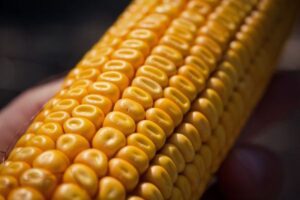
The Turkish vessel Polarnet, which left the port of Chornomorsk (Odessa region) on August 5 with 12,000 tons of corn from the Kernel agricultural holding, arrived at the Turkish port of Derince on August 8.
Kernel completed one of the most important missions – the first ship with Ukrainian grain arrived at its destination. The shipment was carried out as part of the initiative for the safe transportation of grain and food from Ukrainian ports,” the group of companies wrote on Facebook on Tuesday.
It is specified that the ship was loaded with corn at the Transbulkterminal grain terminal in Chornomorsk, which is part of Kernel. In the 2020/2021 marketing year (MY, July-June), the terminal handled 7.6 million tons of grain crops, which is 22% more than in MY 2019/2020, and became the largest in the country in terms of transshipment of agricultural products.
Agropromholding emphasized that Ukrainian agricultural exporters remain key suppliers of foreign exchange earnings to Ukraine, which is an important positive factor for the economy of the warring country.
“If we manage to maintain the trend and increase exports, farmers will not have to reduce the area under crops, and Ukraine will feel a deficit in state budget revenues,” Kernel summed up in the message.
Before the war, Kernel ranked first in the world in the production of sunflower oil (about 7% of world production) and its export (about 12%), and was also the largest producer and seller of bottled sunflower oil in Ukraine. In addition, the company was engaged in the cultivation of other agricultural products and their sale.
Its largest co-owner through Namsen Ltd. is Ukrainian businessman Andrey Verevsky with a share of 41.3%.
The agricultural holding in fiscal year 2021 (FY, July 2020 – June 2021), increased its net profit by 4.3 times compared to FY 2020 – up to $513 million, its EBITDA increased 2.1 times – up to $929 million, revenue – by 38%, to $5.65 billion.